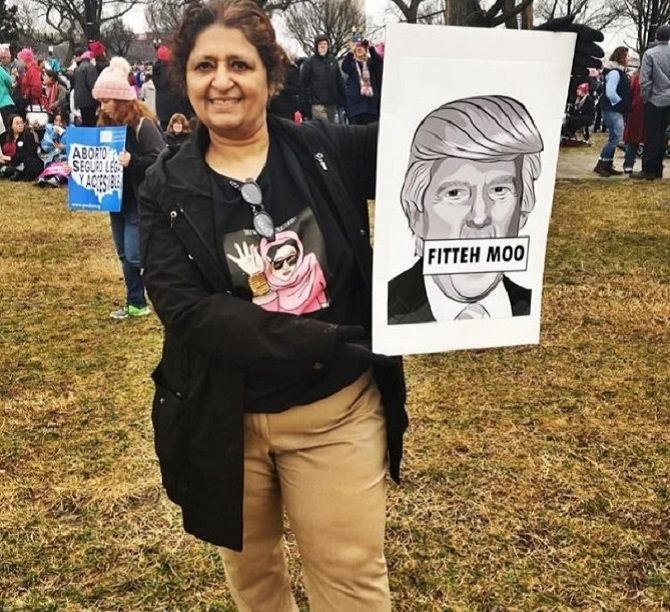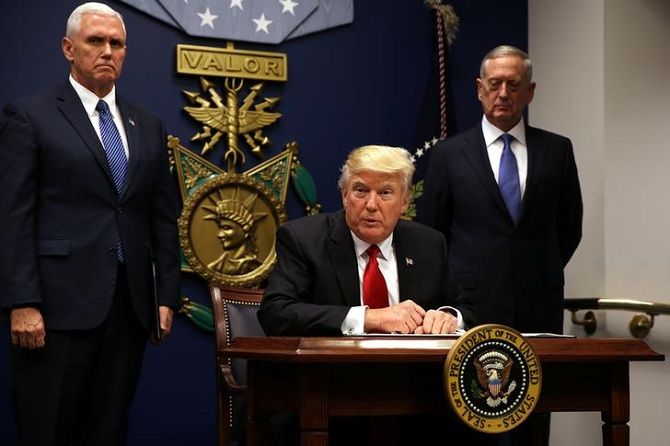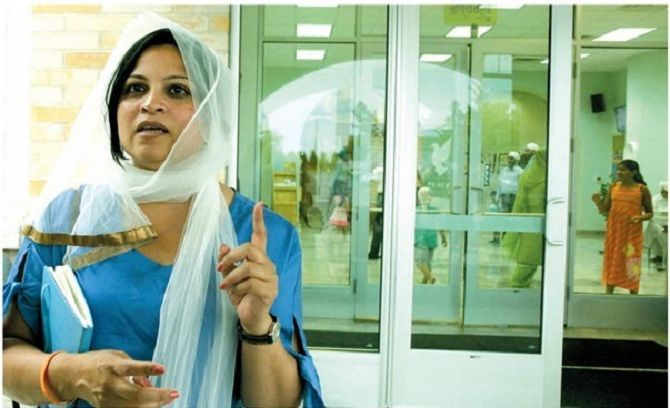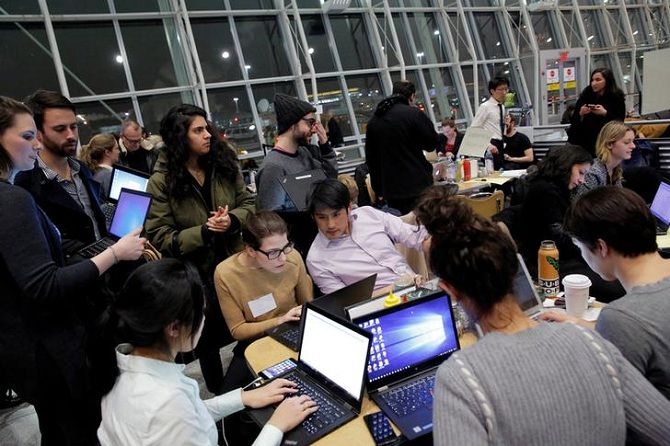'We are going to see relatively soon an executive order that deals with H-1B and other temporary visas.'
'We are also going to see an executive order on undocumented people.'
'Undocumented Indians comprise the largest population growth of all undocumented people in this country.'
'Just because India is not named in this executive order doesn't mean it won't be in the future.'
American activist and lawyer Deepa Iyer tells Rediff.com's Monali Sarkar why Donald Trump's immigration action against Muslims should worry everyone.

Photograph: Kind courtesy Sara Taseer/Twitter
"What we are seeing around the country is a lot of chaos in terms of how to make sense of this executive order (EO)," Deepa Iyer -- South Asian American activist, lawyer and author of the American Book Award-winning We Too Sing America -- says during a late night phone call to discuss United States President Donald Trump's immigration action.
The EO calls for 'extreme vetting' -- effectively a ban -- of people entering the US from seven Muslim majority countries (Iran, Iraq, Syria, Sudan, Libya, Yemen and Somalia).
It also bans the entry of Syrian refugees until further notice, as part of new measures to 'keep radical Islamic terrorists' out of America.
"It even included legal permanent residents, or Green Card holders," Iyer says. "Secondly, it indefinitely eliminates the Syrian refugee programme, and the refugee programme as a whole is suspended for 120 days."
"We are seeing tremendous misapplication and uneven implementation of the executive order," Iyer adds. "CBP have not been trained properly in terms of what to do, so people are undergoing tremendous human rights violations, civil rights violations."
Iyer travelled back to the US from India just as the EO was coming into force.
And as someone who has worked on immigrant and civil rights issues since the 1990s, including helming the national advocacy organization South Asian Americans Leading Together, she immediately thrust herself into doing what she does best.
"I have been involved in issues affecting South Asian Muslim and Arab communities since 9/11. I am continuing to be involved in that," she says. "Right now I have a couple of different projects as part of my fellowship (at the Centre for Social Inclusion). One of them is to support Muslim Arab and South Asian groups in different ways as they navigate this new landscape. I am doing a little bit more writing... which will hopefully uplift more of these issues."
She is also travelling to address college campuses and community organisations "around how to build inclusive and equitable societies even as we face a very difficult and challenging situation."
Iyer made time to talk to Rediff.com's Monali Sarkar about the worrying consequences of the immigration action and why it is so important for Indians and Indian Americans to stand in solidarity with other communities.

Did you expect an immigration ban to come so soon or at all for that matter?
We -- as in advocates who work on these issues -- expected it to come.
We expected it to come in the first week. We did not expect the scope and impact of it though.
What are you seeing around you? What you are feeling?
What we are seeing around the country is a lot of chaos in terms of how to make sense of this executive order...
A lot of community members who were in transit when that EO was issued were caught in airports in sort of this limbo status -- not knowing whether they could enter the country even though they had valid visas or if they would be returned to their own country or another one.
There have been a lot of questions about how these policies came into being in the first place -- whether they were properly vetted by federal agencies and Congress before they were put into place.
My focus is around how communities are experiencing these sorts of policies.
Communities, I think, are both in shock and in fear of what the impact is of policies like this.
But there is also a growing strand of resistance; people are rising up as they did in terms of the protests at the airports to register their opposition.
How are activists getting South Asian Americans -- especially first-generation immigrants who have traditionally kept their heads down -- involved?
I think there has been a lot of movement and involvement by South Asians in the US multi-generationally, but it looks different.
It might not be as visible or vocal, but it includes people running for office at local levels, and setting up faith institutions, civic and political organisations, and social justice groups.
In the 15 years after 9/11, we saw a lot of people became awakened. Their political conscience became awakened.
That has seen a response in terms of people wanting to work at non-profits, people wanting to work in the media, people wanting to raise their voices against the injustices they are seeing. And I think that is continuing now.
With the first generation, I have a personal anecdote.
My mother was telling me that a group of her friends -- the Indian aunties I grew up with in Louisville, Kentucky -- participated in one of the women's marches (against Trump) in Louisville.
That to me was an indication that people of different ages and backgrounds are really aware that we are in a political climate that is very divisive.
That the only way we can create change is if we speak up, if we rise up.
Otherwise, we normalise the situation and we make it okay for these policies to occur.
The power of the individual to create change and work in collective with others is something that we are seeing across generations and racial backgrounds.
A 19-year-old Lebanese-origin boy with an American passport was held for hours at O'Hare airport on January 29. He told the Chicago Sun Times that agents asked him, 'Do you love your country?'
As someone who has fought the civil rights challenges since 9/11 from the frontline, did you ever imagine you would see a day like this?
That's really disturbing. It is connected to what many people are calling a values test, which is also written into this EO.
I think the EO says something like we want people in this country who don't want to harm Americans.
The question is: how do you show that?
What is going to be enough to show that you do care for the country?
Do you have to be Christian?
Do you have to have specific view points on social issues?
It is a very, very dangerous idea to put anything like a values test or a religious test or any of this sort of vetting before people are allowed into the country.
It goes against all of the principles that underlie the immigration system in the first place.
Would you call this the worst sort of persecution America has seen since 9/11?
I think it's a continuation of the types of national security policies we saw after 9/11.
What is, in a way, devastating is it seems as though we have not learned a lesson in terms of the ineffectiveness of the policies that were implemented after 9/11.
It's a fact that one is very unlikely to be killed by an Islamic extremist in this country.
It's a fact that gun violence is something that is much more egregious in this country.
It's a fact that any sort of national security policies that have targeted whole swathes of people -- like all Muslims or all people from certain countries -- have not been effective.
They have just been a waste of tax payer dollars, and they haven't actually met the goals of keeping us safe and secure.
They have also diminished trust between the communities that are impacted -- like Muslim and South Asian communities -- and government and law enforcement.
Those are the lessons we should have been learning in the 15 years after 9/11.
What this shows is that we have not learned that; we don't really have a sense of history or at least the policy makers who are making these decisions don't have a good sense of history.
They don't understand that this is not the way.
Criminalising, policing, demeaning people is not the way to create a safe, inclusive society.

Sikhs have borne the brunt of hate crimes -- often being mistaken for Muslims -- since 9/11.
Photograph: Kind courtesy Deepa Iyer
There is much evidence to show that even the belief that the government will allow something like this -- leave alone direct policies like this one -- emboldens bigots to act against people of all religions and colours.
It is also known to increase bullying in schools, which in any case is a huge problem in the US.
As a mother, how are you coping with it?
It has been difficult. We've had some conversations around the political climate with our son, who is six-and-a-half years old.
We definitely also saw in our public schools system where we live several incidents of bigotry, vandalism.
That's a thing we are really concerned about as parents.
We try to have conversations with our son that are focussed on what the values are that people share and how it's important to be a better person every single day in terms of the treatment of other people.
Those fundamental values are important in all sorts of conversations regardless of who you are talking to.
There was a clear attempt during this election cycle to portray Hindu Americans/Indian Americans as separate from groups Trump was targeting in his campaign rhetoric.
Even now -- despite instances like a South Asian woman in Maryland being questioned by the police for simply walking in her neighbourhood -- there are groups like the Republican Hindu Coalition that support Trump's EO.
Do you find this misguided or just bigoted?
It plays into the belief some Hindus or some Indians have that they are somewhat superior or more special than other South Asians.
It is very dangerous to accept that, because, as you know, there is no such cultural gene that makes anyone superior to anyone else.
At this moment it is very important for Hindus and Indians to reject being used as wedge between communities.
We also should not be so confident that these policies won't affect us.
Just because we are not named -- just because India is not named, for example, in this executive order -- it doesn't mean that it won't be in the future.
We are going to see relatively soon an executive order that deals with H-1B and other temporary visas.
We know that Indians comprise a large number of people that acquire those visas, so there is going to be some impact at some level.
We are also going to see an executive order on undocumented people, including undocumented youth.
We know that undocumented Indians comprise the largest population growth of all undocumented people in this country.
So, we are going to get affected no matter what.
It is important for us to be in solidarity with other communities, to resist any of these wedges and to be very clear about where we stand in this political moment.
It is important to recognise that Islamophobia and xenophobia impact all persons of colour, regardless of religion; the Wisconsin gurdwara attack, the Sureshbhai Patel case, and Sikhs constantly getting stopped at airports prove that.
However, there are people in India who still believe something like this won't impact them.
As one Indian CEO said, 'It is certainly not like he is putting walls around India.'
How does one change that mindset?
I don't know if I should be talking to how Indians change their own mindset, but I will say broadly that we are living in a very global economy, a global society.
We have family members that we care about in the US and in India, so it isn't as though we can say well that belongs over there and it doesn't belong here.
I also think it's important to remember that -- maybe this won't be a popular opinion -- at some level in both these democracies (the US and India) we are seeing a strand of nationalism emerge.
It is important to think about why that is happening not just in these two places but other parts of the world, and how will we protect those who are most disempowered and vulnerable when you have got government powers preferencing certain communities or races over others.
There was a lot of talk post election about liberals being as deaf to the other side's concerns as the conservatives.
Do you see any merit in that argument, and if so is something being done to change that?
We live in a very polarised country right now, but at the end of the day we need to be starting a conversation with an affirmation of what our values are.
I think there are fundamental values that people share, regardless of their political party, around human dignity, respect and equality.
A reaffirmation of that is very important in order to create spaces where we can hear each other.
So, even if there is disagreement we know that we are starting from the same place and we want to end in the same place.
Given that terrorism is a deep concern, but a blanket ban on refugees or certain immigrants cannot be a solution, in what manner does the present immigration system need to adapt itself?
The refugee system, at least in the US, is an extremely vetted process.
It takes 12 to 18 months after a review by multiple federal agencies and international agencies in order for a refugee to even enter the US.
It includes significant background and security checks.
Facts often get lost in our country right now, but that's the reality of what it means to be part of the refugee admissions programme.
There are national security policies that you are actually implementing -- investigations, interrogations, detentions based on legal standards and probable cause.
If there is enough specific evidence about a particular individual that leads law enforcement to believe that they could be a threat, then, of course, law enforcement should follow up on that.
But what we've often seen is the opposite -- that law enforcement will just basically have a blanket response to Muslim communities.
They will send in informants into mosques.
They will spy on events of a Muslim students association.
They will spy on cricket and soccer matches in public parks.
They use this blanket approach rather than using a specific credible threat approach that is individualised and needs legal standards.
That's where I think we need to begin or revert too.
The other process is just basically an exercise in fear and an exercise in diminishing trust between communities and law enforcement.

Photograph: Sndrew Kelly/Reuters
Acting Attorney General Sally Yates, who refused to defend Trump's EO on immigration, was fired.
How can civil and social justice organisations deal with an administration like this?
Right now, it is really important for civil society and social justice organisations of all backgrounds to live up to their missions.
I think we are seeing that. We are seeing organisations resist the Trump administration's policies.
We are seeing organisations engage in litigation strategies to challenge unconstitutional, unjust policies.
We are seeing organisations really speak truth to power.
Our social justice organisations are, in a way, the moral conscience of our nation, so that work must continue.
But I also think that each individual has a role to play in this moment.
Dr Martin Luther King, Jr used to call it the 'urgency of now,' and we are in a moment where there is a tremendous urgency of now.
Every single individual has to figure out how they can meet that urgency in their own lives.
There is a temporary stay in place.
But there are also many stories about how those orders are being defied at various airports.
What next?
In terms of the particular EO, there will continue to be legal challenges to ensure that people are not being detained unnecessarily.
There might be even larger litigation that challenges the Trump administration directly.
We will also continue to see these mobilisations and protests around the US and a lot of resistance from various sectors.
For example, we saw the tech sector (speaking out), and many of those people are Indian heads of companies.
We will see more people like that, more mayors and governors, hopefully federal representatives, take some strong stands.
In many ways we have to make it untenable for the administration to make these bans prominent.
Right now they are in place for 90 days, for 120 days; this is just phase I.
How do we make sure that phase II, which could be more harmful and involve more communities, doesn't get implemented?
The Western world as we know it is on a precipice at the moment. How do you think Trump's actions affect that balance?
It's hard for me to answer because I am not a global expert. But what I will say is what we are seeing is the confluence of different phenomena that are happening in different parts of the world.
The phenomenon of xenophobia against immigrants and refugees who are perceived as job takers and who are seen as people who corrupt the 'true culture' of the nation.
The second phenomenon is racial anxiety, which is in response to the demographic changes that are happening in different parts of the world with the influx of immigrants and refugees, with more communities of colour being born in particular countries.
Some perceive that as a threat to their own sense of power, to their own sense of benefits.
And the third phenomenon is Islamophobia, which I think is really affecting the way in which people are treated in the US and Europe.
Brexit, the rise of white nationalist organisations, the mainstreaming of white supremacy, the election of Trump -- all of these, I think, is reflective of these three phenomena.
Travel advisory
It is very possible that people who are not from the seven banned countries will also face difficulties. What tips do you have for people travelling to the US now?
1. At many of these airports there are lawyers on standby.
If you happen to be detained, if you happen to be asked certain questions, it is important to ask for legal counsel.
There might be people right there in the airport that you can connect to.
Many lawyers are saying that if you are detained by Customs and Border Patrol, you are in a way in custody (entitling you to legal counsel).
There are many nuances to it and I don't want to give legal advice, but it is important to voice that (a request for legal counsel).
2. We have heard reports of people being asked to sign different waivers and forms. It is very important not to sign something that one doesn't understand.
3. Ask for an interpreter if one doesn't speak English well.
4. Ask to call family members or sponsors in the US in order to be connected with immigration lawyers that can help you.
5. If you are going through something like this write it down -- even if it is afterwards -- to document what happened.










